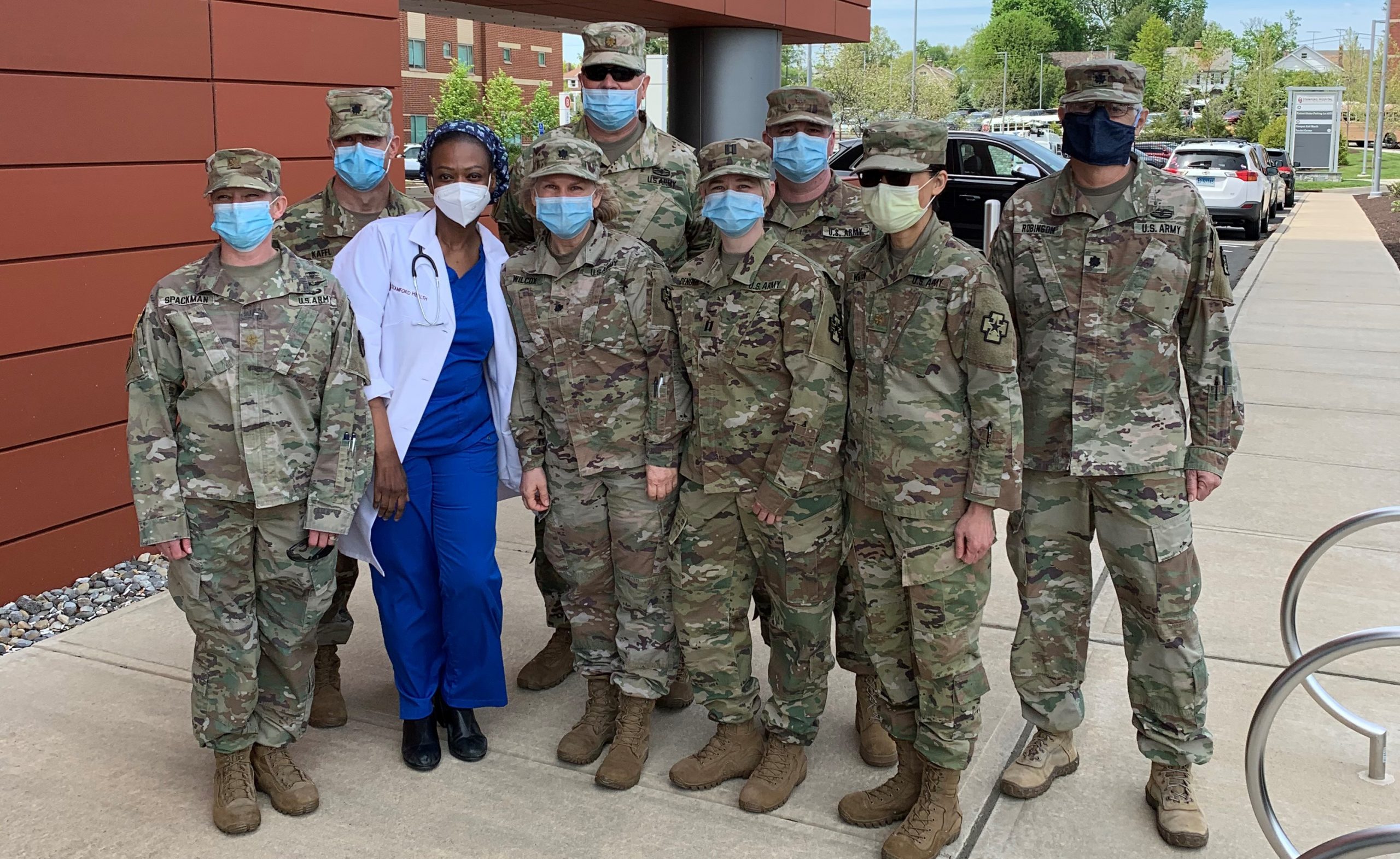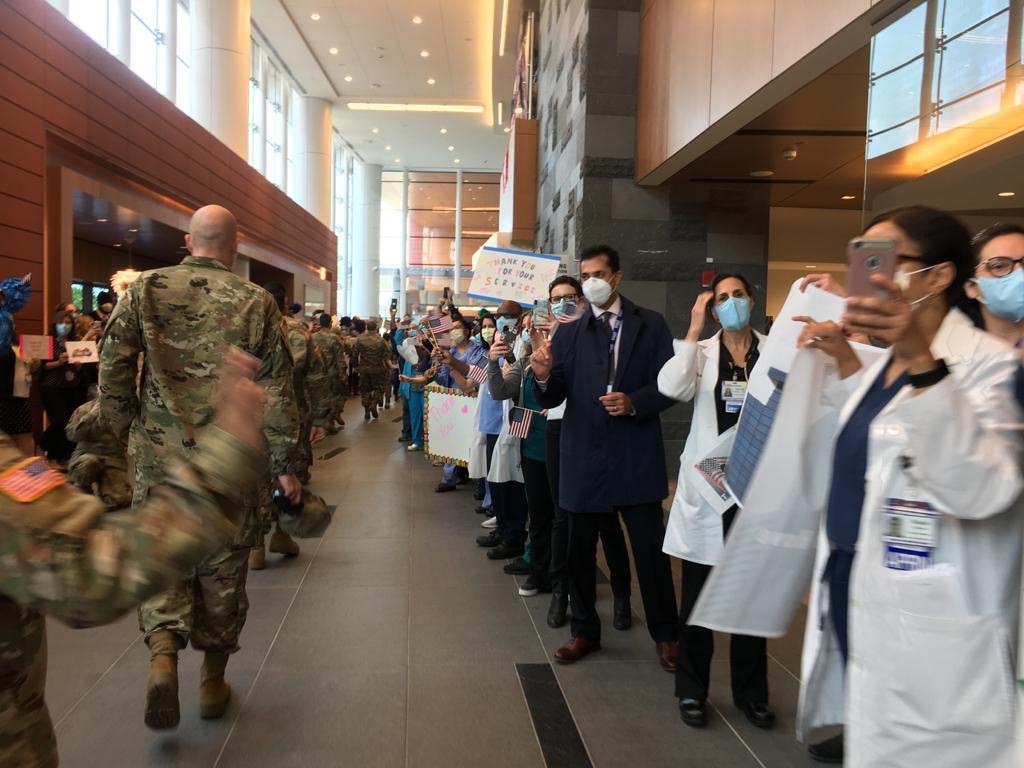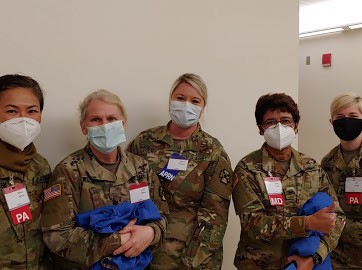US Army Reserve PAs Deployed to Assist in COVID-19 Response
Task Force Assigned to Stamford, CT, to Reduce Stress on Hospital Staff
By CPT Jennifer Dengler, DMSc, PA-C, MS
July 9, 2020

A unique cohort of United States Army Reserve (USAR) PAs was called to serve their country in uniform on April 4, 2020. With fewer than 48 hours notice, this team was pulled together to create the 811-1 Urban Augmentation Medical Task Force (UAMTF) with a mission assignment to Stamford, Connecticut, to assist in the COVID-19 response.
This is the first time in U.S. history that soldiers were utilized in this capacity and that medical was highlighted in this way. More than 1,200 medical professionals deployed to support medical sites from New York to the Mariana Islands, including New York City, Detroit, Philadelphia, and Boston.
These PAs left behind their civilian careers to serve in COVID-19 hot spots. The USAR worked diligently to ensure that the PAs pulled to serve were not critically needed in their civilian roles at that time. We served alongside physicians, nurse practitioners, nurses, medics, and numerous support staff in order to provide improved access to care to the residents of Fairfield County, Connecticut, and to assist with reducing the stress on the local hospital staff.
The 811-1 UAMTF included:
- LTC Nicholas Kaffl, Orthopaedics/Spine Surgery, Woodbury, New Jersey
- LTC Craig Robinson, Emergency Medicine, Denver, Colorado
- LTC Victoria Wilcox, Cardiology, Tomah, Wisconsin
- MAJ Debi Nguyen, JD, Cardiovascular Thoracic Surgery, Dallas, Texas
- MAJ Phillip Erthall, Orthopaedics, West Frankfort, Illinois
- MAJ Terry McPherson, Orthopaedics, Greenville, Kentucky
- MAJ Jill Spackman, Aeromedical, Active Duty Ft. Campbell, Chief Soldier Health Services and LaPointe Medical Home Officer in Charge
- CPT Jennifer Dengler, Primary Care, Ashland, Oregon

A unique assignment for Reservists
This scenario was much different than anything that has happened in U.S. Army Reserve history. Reservists generally have a significant amount of time to prepare for their time away from home and family. Our task force had between 36 and 48 hours to report to duty! This required me to take time from work to pack, prep our wills and trust, and prepare my husband for his new homeschool mission since our boys’ school was closed due to COVID-19. As one soldier said, “This is the first time we left our family with the enemy.”
It was very stressful to respond to the COVID-19 crisis and leave our families behind, hoping that they did not become ill and that they could manage without the usual support received from the community. As a parent, it was tough knowing that my kids would not have playdates to help distract them, school to help make the days go by faster, and the community to help my husband.
[Video interview with Army Reserve Captain Jennifer Dengler]
High stress being away and coming home
The stress was definitely high and we had no idea how long we would be responding to this crisis. While away, I was fortunately able to Skype frequently with my family. I took an extra set of UNO cards and we would play as a family virtually. I took some of their books for homeschool and would read to them from my hotel room so I could feel as though I was still participating in their education. We would also send Skype messages to each other throughout the day so that the boys would feel that we were still close.
There were certainly days that were extra hard for my husband – the boys were very sad and there were days they wouldn’t talk to me as it was too painful not knowing when they would see me again. On the bright side, I wasn’t home to tell them to stop playing video games, so they appreciated that! Coming home was a stressful event as well, one that is very common for military families as it takes time to reintegrate and emotions are high. It is tough for children to navigate the sense of being abandoned and to understand the concepts of mission and duty to serve, and why it was important for me to leave. The first week back home was filled with a mix of emotions, but now that the boys have processed what has happened they are definitely proud of the service and my role in the USAR.
U.S. Army Reserve operations
Army Reserve support of U.S. Army North COVID-19 response operations constituted one of the largest domestic mobilizations in its history – in excess of 3,000 soldiers mobilized at the height of the response. In fewer than two weeks, an entirely new type of unit – the Urban Augmentation Medical Task Force (UAMTF) – was created to support U.S. Army North, FEMA, and the Department of Health and Human Services at field medical sites in cities across the nation.

UAMTF personnel were drawn from the 3rd Medical Command (Deployment Support), 807th Medical Command (Deployment Support), and Army Reserve Medical Command (ARMEDCOM). Each UAMTF consisted of 85 critical medical specialty personnel including operational medicine, infectious disease, preventive medicine, nursing, respiratory therapist, clinical psychologist, occupational therapist, dietician, pharmacist, and other medical specialists, as well as clinical and administrative staff. The Army Reserve created 15 UAMTFs.
Each UAMTF is capable of providing the same service as a 250-bed hospital. UAMTF members were selected by areas of concentration/Military Occupational Specialty skillsets. Medical professionals currently engaged in response efforts in their civilian careers were not mobilized. Army Reserve soldiers also provided logistics, administrative, engineering, military intelligence, transportation, liaison, and military history expertise.
Lt. Gen. Charles D. Luckey, Chief of Army Reserve and Commanding General, U.S. Army Reserve Command, said of the efforts, “I’m phenomenally proud of this entire component of the Army, the effort, the energy, the focus, the discipline, and the spirit that America’s Army Reserve has brought to this fight. We have, in fact, saved lives and we have lifted the spirits of an entire nation. And everybody on the squad played a part in making sure that happened.”
CPT Jennifer Dengler, DMSc, PA-C, MS, has been a PA for six years and in the USAR for three years. She currently serves as a PA at Asante Hospital and Health Care in Medford, Oregon. Contact her at [email protected].
You May Also Like
On the Front Lines: PA Student Dustin Norman
PAs on the Front Lines: Alyssa Zantello Helps New York City During COVID-19
COVID-19 and PA Students: Adapting to Emergency and Lending a Hand
Thank you for reading AAPA’s News Central
You have 2 articles left this month. Create a free account to read more stories, or become a member for more access to exclusive benefits! Already have an account? Log in.



